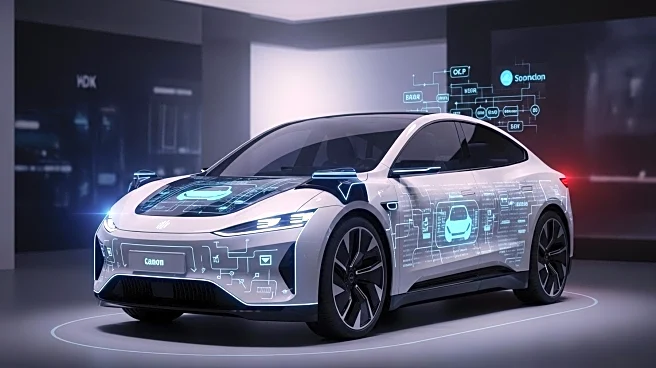What is the story about?
What's Happening?
Tesla has experienced a 13% year-over-year decline in global electric vehicle (EV) deliveries, raising concerns about its market position. Despite maintaining a stronghold in the U.S. market with 46% of sales in Q2 2025, Tesla is facing increased competition from traditional automakers like General Motors, which nearly doubled its EV sales in the same period. The phase-out of federal EV tax credits by September 30, 2025, has provided a temporary boost to Tesla's Q3 sales, but the overall trend indicates a slowdown. Additionally, Tesla's focus on Full Self-Driving (FSD) technology, which uses a camera-only approach, has been met with mixed consumer sentiment and regulatory challenges, including a significant legal verdict related to its Autopilot system.
Why It's Important?
The decline in Tesla's sales and the rise of competitors like General Motors signal a shift in the EV market dynamics. As the market matures, Tesla's early-mover advantage is diminishing, and its reliance on autonomous driving technology as a growth strategy is under scrutiny. The global autonomous vehicle market is projected to reach $2.3 trillion by 2030, presenting a significant opportunity for Tesla if it can overcome regulatory and consumer hurdles. However, the mixed reception of its FSD technology and the competitive edge of rivals like Waymo in the robotaxi space pose challenges to Tesla's long-term growth prospects.
What's Next?
Tesla plans to launch its robotaxi service in Austin, Texas, aiming to leverage its extensive fleet for data training and a ride-hailing network. However, it faces competition from Waymo, which has already achieved significant milestones in the robotaxi market. Tesla's ability to scale its autonomy initiatives and maintain profitability will be crucial in determining its future success. Investors are closely watching Tesla's next moves, particularly its FSD v14 update and broader AI-driven projects, to assess the company's potential to capitalize on the growing autonomous vehicle market.
Beyond the Headlines
Tesla's situation highlights broader industry trends, including the increasing importance of AI and autonomous technology in the automotive sector. The company's challenges with consumer acceptance and regulatory compliance underscore the complexities of deploying advanced technologies in real-world scenarios. As Tesla navigates these challenges, its strategies could influence industry standards and consumer expectations for autonomous vehicles.

















